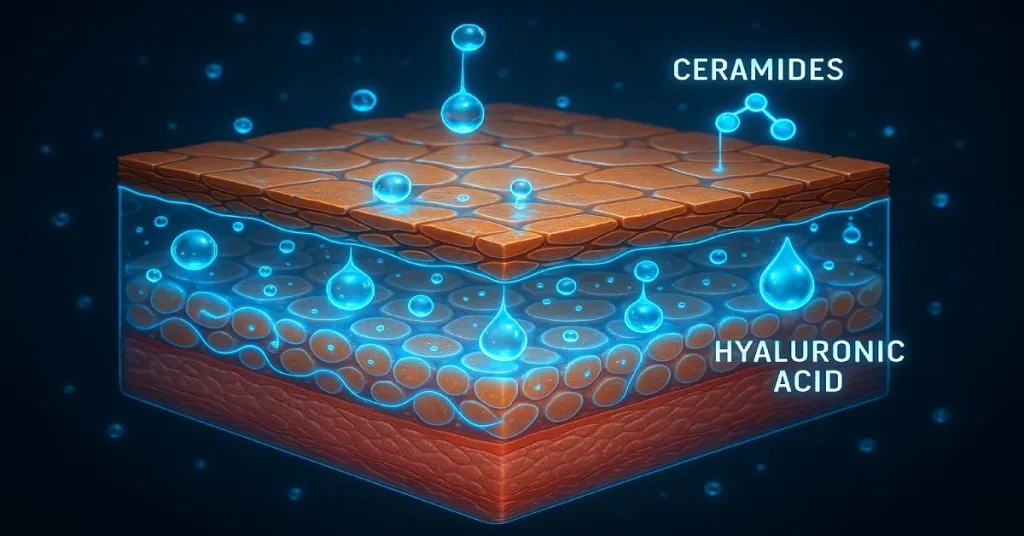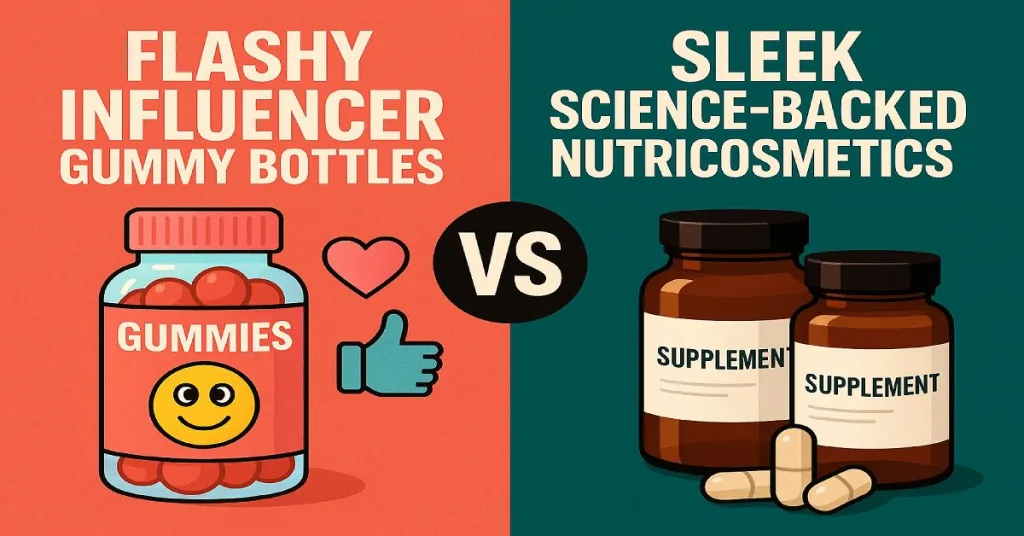What Are Nutricosmetics?
Nutricosmetics are the fusion of nutrition and cosmetics — supplements designed to improve the look and health of your skin, hair, and nails from the inside out. Instead of just rubbing creams on your face or slathering oils on your scalp, nutricosmetics work by giving your body the nutrients it needs to build stronger, healthier tissues naturally.
The concept has exploded into a multi-billion-dollar global industry. Collagen is the superstar supplement, but collagen alone isn’t the magic fix. In reality, beauty-from-within is much bigger — and more effective — than just collagen powders.
This post contains affiliate links. If you buy through these links, we may earn a small commission at no extra cost to you.
Why Collagen Isn’t the Whole Story
Collagen makes up the bulk of your skin and connective tissue, which is why it’s marketed as a miracle anti-aging supplement. But here’s the catch:
- When you drink collagen, your body breaks it down into amino acids — it doesn’t just go straight to your skin.
- Some hydrolyzed collagen peptides do appear to stimulate collagen production, but results are modest and require 2.5–10 g per day for 8–12 weeks.
- Overhyped collagen waters and overpriced tubs often underdose the real effective amount.
Collagen has its place, but if you stop there, you’re missing out on the broader nutricosmetic arsenal that truly supports hydration, elasticity, barrier repair, and antioxidant defense.
The Real Nutricosmetic Players
Silica: The Forgotten Mineral for Stronger Hair and Nails
Silica (often from horsetail extract or orthosilicic acid) is one of the most underrated beauty nutrients. It helps build keratin, the protein that makes up your hair and nails, and supports collagen formation in your skin. Unlike collagen supplements that give you broken-down protein, silica provides raw material your body can actually use to construct stronger structures.
Studies show silica supplementation can improve hair thickness and reduce nail brittleness — making it a quiet powerhouse for those who are tired of endless biotin hype.
- Dosage: 10–30 mg per day.
- When to take: With food for best absorption.
- Side effects: Generally safe, though extremely high intakes may stress kidneys.
Ceramides: The Skin Barrier Builders
Ceramides are lipids that make up your skin barrier, locking in hydration and keeping irritants out. While you may know them from topical creams, oral ceramides (usually wheat- or rice-derived) deliver similar benefits from the inside.
Clinical studies show that daily ceramide supplementation reduces transepidermal water loss, boosts hydration, and smooths fine lines — often within 4–6 weeks. That’s a faster timeline than collagen powders typically deliver.
- Dosage: Most clinical studies use 20–40 mg of active ceramides per day. On supplement labels, you’ll usually see much higher numbers (like 350 mg) — but that’s because the listed amount refers to the whole wheat or rice extract, not just the ceramides inside it. A 350 mg capsule of Ceratiq® wheat extract, for example, typically provides about 15–20 mg of actual ceramides. That means one to two capsules daily is enough to hit the clinically studied range.
- When to take: Anytime, but consistency matters.
- Side effects: Rare. If wheat-derived, check labels for gluten sensitivity.

Hyaluronic Acid: Hydration from the Inside Out
Hyaluronic acid (HA) is famous in skincare serums, but taken orally, it hydrates skin from the inside. HA binds water molecules, helping your skin stay plump, smooth, and elastic. Natural HA levels decline as you age — which is one reason skin loses firmness over time.
Studies confirm that HA supplementation improves skin moisture and elasticity, with visible results in 6–8 weeks.
- Dosage: 100–240 mg per day.
- When to take: Anytime with water.
- Side effects: Very safe; mild digestive upset is rare.
Peptides: More Than Just Collagen
Bioactive peptides act like messenger signals, telling your body to repair and regenerate. Collagen peptides are best studied, but elastin and keratin peptides also show promise for skin strength and elasticity.
Unlike plain collagen powders, specific peptide formulas target certain processes. For example, some peptides help stimulate elastin (which keeps skin bouncy), while others boost keratin for stronger hair and nails.
- Dosage: Collagen peptides: 2.5–11 g/day; other peptides vary by source.
- When to take: Daily, either in one serving or split doses.
- Side effects: Very safe; high doses may cause bloating or mild stomach upset.
Biotin: The Most Overhyped Beauty Supplement
Biotin is everywhere — gummies, capsules, powders — and is marketed as the must-have for hair and nails. It does play a role in keratin production, but here’s the truth: biotin deficiency is rare. If you’re not deficient, megadosing won’t give you Rapunzel hair.
Still, studies show that biotin can help brittle nails and weak hair — just not to the magical extent influencer ads suggest. The real caution: high doses can interfere with lab tests for thyroid and heart conditions, sometimes leading to dangerous misdiagnoses.
- Dosage: 2.5–5 mg/day (2,500–5,000 mcg) — but only shown to help brittle nails or confirmed deficiency.
- 👉 Note: Most people already get ~30 mcg/day in a multivitamin or diet. High doses are unnecessary unless deficiency is present.
- When to take: With meals.
- Side effects: High doses (10,000+ mcg) may interfere with medical tests.
Antioxidants: The Real Anti-Aging Players
Wrinkles and sagging skin come largely from oxidative stress — free radical damage triggered by UV rays, pollution, and stress. Antioxidants neutralize those free radicals, making them true anti-aging allies.
- Vitamin C
Supports collagen synthesis and UV protection.- Dosage: 500–1,000 mg/day.
- When to take: Split into two smaller doses for better absorption.
- Side effects: High doses may cause digestive upset.
- Vitamin E (d-alpha-tocopherol)
Works with vitamin C to protect skin lipids from damage.- Dosage: Dosage: 15–100 mg/day (≈22–150 IU). The official RDA is 15 mg/day. Most supplements sold are 180 mg (400 IU) or higher — that’s well above daily needs and should be reserved for short-term or specific uses (like deficiencies).
- When to take: With a meal that contains fat for absorption.
- Side effects: Long-term high doses (≥400 IU daily) are linked to increased bleeding risk and, in some studies, higher all-cause mortality. Avoid chronic megadosing.
- Astaxanthin
A powerful carotenoid with clinical backing for improving skin elasticity and reducing fine lines.- Dosage: 4–12 mg/day.
- When to take: With a fat-containing meal for absorption.
- Side effects: Very safe, though high intake may tint skin or stool slightly.
Unlike collagen hype, antioxidants have decades of evidence showing they actually slow visible aging.
Zinc & Selenium: The Skin Regulators
These two minerals often fly under the radar in beauty discussions, but deficiencies can wreak havoc on your skin. Zinc helps control oil production, fight acne, and speed wound healing. Selenium protects skin from oxidative damage and supports elasticity.
- Zinc
- Dosage: 10–15 mg/day for maintenance.
- 👉 Short-term corrective use can reach 25–30 mg/day, but long-term high intake risks copper deficiency. Pairing with a small amount of copper helps balance.
- When to take: With meals, ideally protein-rich foods.
- Side effects: Too much zinc can cause nausea and long-term copper deficiency.
- Selenium
- Dosage: 55–200 mcg/day (upper safe limit: 400 mcg).
- When to take: With meals.
- Side effects: Excess can cause brittle nails, hair loss, and neurological issues.
These aren’t flashy ingredients, but they’re essential. Without zinc and selenium, no collagen powder will fix your skin.

The Overhyped and the Useless
Some nutricosmetics are pure marketing:
- Hair gummies → overpriced candy with sugar and low-dose biotin.
- Collagen waters → $4 flavored amino acid drinks with weak results.
- Proprietary blends → vague “beauty complexes” hiding underdosed ingredients.
- Underdosed ceramide or HA pills → unless they hit studied ranges, they won’t work.
Smart Buying Guide: How to Choose Nutricosmetics
- Check dosages. Match what clinical trials use, not what brands sprinkle in.
- Look for third-party testing. Ensures purity and safety.
- Avoid sugar-based gummies. Cute packaging, zero real results.
- Don’t overpay for hype. The same hyaluronic acid or silica can cost half if you skip the influencer brand.
Where to shop:
- Amazon → Huge variety, including budget options.
- iHerb → Niche ingredients like ceramides and astaxanthin.
- Walmart → Reliable basics at lower cost.
FAQs
Do nutricosmetics work?
Yes — but only when ingredients are dosed properly.
How long until results show?
Usually 8–12 weeks. Skin turns over every ~28 days, hair grows slowly, and nails take months.
Can I take collagen with other nutricosmetics?
Yes, and it often works better as part of a broader routine.
Are there risks?
Yes. Overdosing minerals like zinc or selenium, or taking excessive biotin, can cause harm. Always stay within safe ranges.
Closing Thoughts
Collagen may dominate the marketing, but real nutricosmetics go far beyond it. Silica, ceramides, hyaluronic acid, peptides, antioxidants, and minerals like zinc and selenium form the foundation of true “beauty from within.”
Don’t waste money on sugar gummies or overpriced powders. Choose supplements that match research-backed dosages, take them consistently, and give them time to work. With the right nutricosmetics, you can support skin, hair, and nail health in a way that’s more powerful — and more honest — than collagen hype alone.
you may like: Flu Season is Coming: Here’s How to Actually Beat It With Supplements